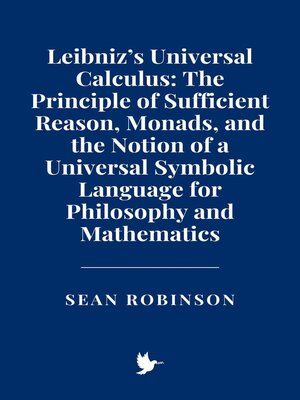Leibniz's Universal Calculus
ebook ∣ The Principle of Sufficient Reason, Monads, and the Notion of a Universal Symbolic Language for Philosophy and Mathematics
By Sean Robinson

Sign up to save your library
With an OverDrive account, you can save your favorite libraries for at-a-glance information about availability. Find out more about OverDrive accounts.
Find this title in Libby, the library reading app by OverDrive.



Search for a digital library with this title
Title found at these libraries:
| Library Name | Distance |
|---|---|
| Loading... |
Discover the groundbreaking vision of Gottfried Wilhelm Leibniz, the 17th-century polymath whose quest for a universal symbolic language and mechanical method of reasoning laid the foundation for modern logic, computation, and artificial intelligence. Leibniz's Universal Calculus takes readers on an illuminating journey through the birth of symbolic logic, metaphysics, and the early dreams of mechanized thought — revealing how his ideas anticipated the digital revolution centuries before computers existed.
From the intricate doctrine of monads and the principle of sufficient reason to the revolutionary invention of binary arithmetic and the calculus ratiocinator, this richly detailed and deeply researched volume unpacks Leibniz's profound influence on philosophy, mathematics, theology, and the future of human knowledge. Blending historical context with cutting-edge analysis, it unveils how Leibniz's universal calculus continues to inspire contemporary fields like artificial intelligence, formal semantics, and knowledge engineering.
Perfect for readers fascinated by the origins of logic, the philosophy of mind, and the history of computing, this book offers a compelling narrative that bridges the past and future of human reasoning. Whether you are a scholar, student, or curious thinker, Leibniz's Universal Calculus invites you to explore the visionary ideas that still shape our quest to understand and formalize the infinite complexity of thought itself.







